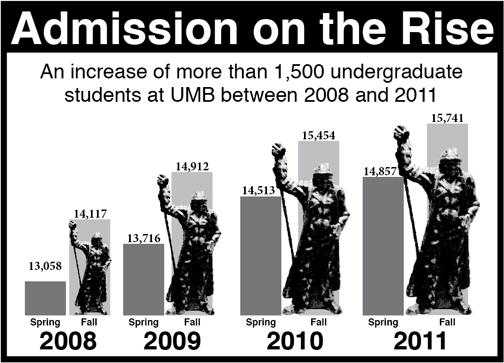New amendments, passed in Oct. 2010, to the Higher Education Act of 1965 place stricter regulations on financial aid awards. Prior to the passage of the amendments, students who failed to meet satisfactory academic progress (SAP) requirements were placed on financial probation for a full academic year. The new amendments shorten the probation period to one semester.
The SAP requirements for undergraduate students are that the student must maintain a minimum GPA of 2.0 (1.75 for freshmen), and complete at least 67% of all credits attempted each semester. Students must also limit the cumulative total of credits attempted to no more than 150% of the credits required by the student’s particular degree program. Graduate students must maintain a 3.0 minimum GPA, and must attempt no more than 150% of the credits required by the degree program.
Students who fail to meet these requirements lose their financial aid. Those students then have the option of filing an appeal with the financial aid department. The most important part of the appeal is the student’s explanation of the circumstances that kept them from meeting the SAP requirements. A committee headed by Director of Financial Aid Judy Keyes reviews the appeals.
Keyes said the committee considers the question, “Is this a student who we feel will be successful if we continue to award them finical aid or is this a student who really needs to take time to re-think their options?”
“[In regards to the appeals] we want to see that the student has a full understanding of what they need to be successful,” Keyes said. “Are they realistic? Do they adjust their course load? Are their reasons for not meeting the standards persuasive? Is this a student who will be successful if we continue to award them financial aid? These are the questions we ask ourselves while reviewing appeals.”
Students seeking to regain their financial aid must also attend a one-hour workshop entitled Achieving Satisfactory Academic Progress. Attending the workshop is a mandatory requirement of a successful appeal; however, attending the workshop does not guarantee that a student’s appeal will be approved.
Students whose appeals are approved are then placed on financial probation. The students will be given the financial aid award they would have normally received for one semester. During that semester, students must meet SAP requirements, or lose their financial aid and be required to go through a second appeals process.
Amber Matchett, English major, views the new regulations as typical. “I’m a transfer student and that’s how my school was; if you didn’t get a 2.0-2.5 GPA, you were done.”
Kaynan Yassin, management major, does not see the reduction in the probationary period as unfair. “I agree with one semester. One semester is enough time to recover,” Yassin said.
There are currently over 425 students on financial probation. If those students do not meet the SAP requirements by the end of the semester, they will have to meet with an academic advisor prior to making their second appeal.
Keyes acknowledged that the new regulations put pressure on an at-risk population. “If a student is far behind and on probation and something happens that causes them to stop making progress, they will be in a lot of trouble,” Keyes said. “But I think the Achieving Satisfactory Academic Progress workshop and academic advising will give the students the information they need to make better decisions about balancing work, family life and education.”





















































